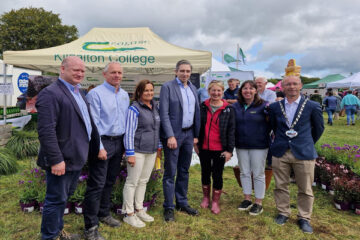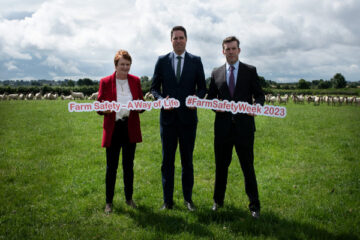The IFA held its annual pre-budget 2022 briefing day this week at the Round Room in the Mansion House, Dublin 2.
One of the most important days in IFA’s calendar, the day was held in line with the Government’s Covid-19 safety guidelines. County Chairs met with TDs and Senators throughout the day to secure Government commitments in the October Budget to support Irish farmers.
This morning, IFA President Tim Cullinan, Farm Business Chair Rose Mary McDonagh and Rural Development Chair Michael Biggins led a delegation to meet with the Minister for Finance, Paschal Donohoe, to put forward IFA’s key asks.
Meetings were also had with the Minister for Public Expenditure and Reform, Michael McGrath and the Minister for Agriculture, Charlie McConalogue.
IFA President Tim Cullinan said there are several key measures the Government must implement if it genuinely wants to ensure the future viability of Ireland’s largest indigenous sector, saying, “farmers across all sectors are facing an increasingly uncertain future. Increasing regulation, Brexit-related trade disruption, the prospect of substantial cuts in direct payments due to CAP reforms, climate action measures and rising input costs means Irish farming is in a perilous position.”
“Now is the time for Government to step up and put action and money behind the rhetoric. IFA is seeking co-financing to ensure that Pillar II schemes such as Areas of Natural Constraint (ANCs); Green Low-Carbon Agri-Environmental Scheme (GLAS); Targeted Agricultural Modernisation Scheme (TAMS); Beef Data and Genomics Programme (BDGP – suckler cows); the Sheep Welfare Scheme and Organic Farming Scheme; are properly funded. We are seeking €300 per suckler cow, €30 per ewe and €300m for ANCs. In addition, we need a new scheme for tillage farmers to stop the exodus from this sector.”
“The Government gave a clear commitment that it would ring-fence €1.5bn of carbon tax receipts for an agri-environment scheme, referred to in the Programme for Government as ‘REPS-2’. We are still waiting for this commitment to be honoured.”
“IFA has made it clear that farmers are eager to be part of the climate solution. Accelerated capital allowances and Value-Added Tax (VAT) exemptions on the purchase of emissions-efficient investment will help farmers to play their role in contributing to the sector’s climate change targets.”
“Renewal of the Young Trained Farmer Stamp Duty Relief post-2021 is also needed to encourage farm transfer and generational renewal.”
IFA Farm Business Committee Chair Rose Mary McDonagh said, “we need significant taxation supports, in particular through investment in emissions-efficient equipment and the removal of discrimination in our tax system for the self-employed.”
IFA Rural Development Chairman Michael Biggins said farm schemes must remain a central part of Government policy, particularly for the low-income dry stock sector, saying, “direct payments are a huge part of family farm incomes. Targeted schemes are increasingly important. Expenditure on TAMS is currently behind target, with approximately 60% of the revised allocation of €523m spent to date. There needs to be increased flexibility along with the inclusion of additional qualifying investments to ensure all funding is drawn down.”
Source: Irish Farmers Association



